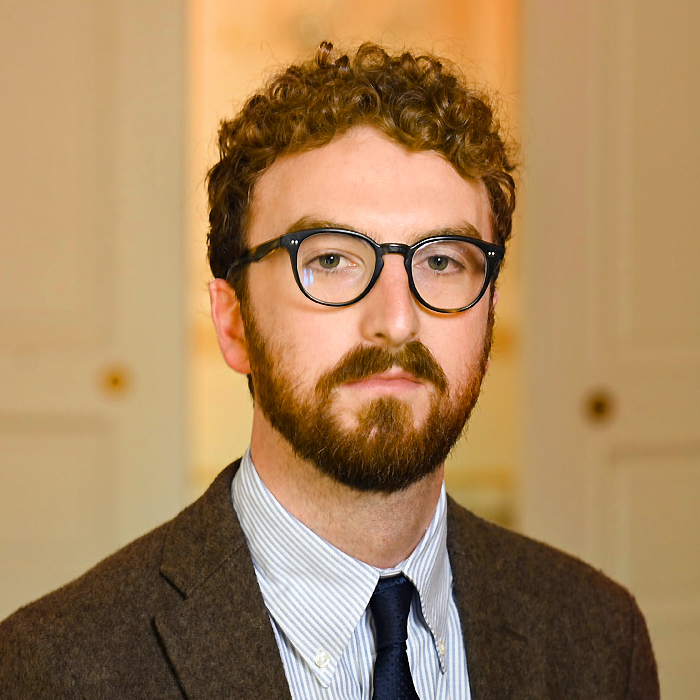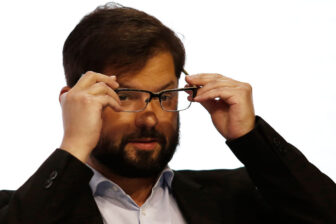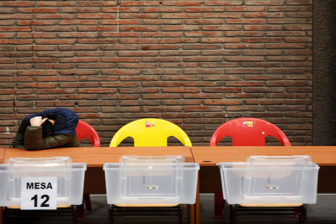A charismatic activist who got his start in the university is elected amid calls for wide-reaching social and cultural change. With the memory of recent military rule still fresh in the minds of citizens, he sets out to promote progressive reforms on gender and other issues, and to build a more substantial social safety net.
These words describe Gabriel Boric, who will take office as Chile’s next president in March. But they could just as easily describe another figure, from a very different time and place: Andreas Papandreou, Greece’s first socialist prime minister, who was swept into office in 1981 with a mandate to bring allaghí (“change”) to his country.
The comparison is an unexpected one, and Chile in 2022 is of course distinct in many ways from Cold War–era Greece. But there are also surprising similarities that can help us gauge the potential of Boric’s reformism. Many of the hazards that Papandreou encountered – from accusations of communism, to having to choose between “social issues” and social spending, to the question of how to pay for new spending programs – will be Boric’s problems to solve as well.
First, let’s mention some important differences. Papandreou won a majority in Greece’s parliamentary system, giving him freer reign than Boric, who must deal with a fractured legislature in which his coalition lacks a majority. When Papandreou sought pension reform, he did not have to hack his way through a warren of private pension funds like the Chilean ones that manage some 65 percent of the country’s GDP. “Another important difference is that Papandreou comes in shortly after the generals,” says Robert Funk, a political scientist at the University of Chile. “Here Boric takes office after 30 years of democracy.”
Papandreou also had the unexpected benefit, as he sought to build a welfare state for Greece, of manna from heaven – or rather, money from Brussels. New EU funds helped pay for increased social spending, and there’s no equivalent Latin American body from which Boric can expect generosity. Chile does have copper mining and untapped lithium deposits that could provide economic rents to power more spending, but it’s not yet clear how much Chile’s lithium will be worth, and there are voices in Boric’s circle who oppose the extractive economic model and may constrain mining in the years to come. In any case, examples abound across Latin America demonstrating that countries erect social programs on a foundation of high commodity prices at their own peril.
But the apparent difference regarding sources of money for social spending may disguise a deeper similarity – and a warning. Papandreou’s decision to fund his social spending more with external funds than by insisting on more in taxes from Greece’s upwardly mobile young urban classes was a fateful one. It helped pave the road to the high levels of public debt that contributed to the crisis of 2014, the “troika”-imposed solution to which continues to weigh heavily on the Greeks and their economy.
Boric confronts a similar problem. In order to last, a more substantial welfare state in Chile will likely have to rest – like Europe’s welfare states do – on higher taxes for the very rich, certainly, but also higher taxes for sections of the middle classes. Chile’s current tax structure is far from that. According to the OECD, only the 25% richest Chileans pay any income tax at all. That puts Chile at the very bottom of the table of OECD countries regarding the threshold at which individuals start having to pay income tax, ahead of only Colombia. And among the 25% of households who do pay income tax, much is paid by a small portion of top earners.
“Such a structure,” write the authors of the 2021 survey, “leads to untapped redistributive potential … the top marginal tax rate only applies to very few affluent households.” The report goes on to recommend lowering the threshold for the top marginal rate, meaning more of Chile’s upper middle classes would have to pay up.
But Boric’s plan for government sets out something quite different: an increase in income tax for only for the top 1.5% of households (along with a wealth tax and new royalties on copper mining). That may well be necessary, but it also may not be enough to considerably increase spending on a permanent basis. And what’s more, it may hint that upper-middle-class Chileans are not infinitely willing to pay more than they are accustomed in taxes in order to fund more generous public services.
When a leader’s political capital is limited, sometimes cultural victories can come at the cost of reforms targeting economic redistribution. Papandreou enjoyed more unequivocal success on the cultural front. He brought abortion and civil divorce to Greece, abolished dowries, and created a splash by making actress and singer Melina Mercouri his culture minister. Reforms on the cultural front were easier to achieve in part because they drew fewer accusations of communism from rival parties than economic redistribution – and less skepticism from the United States, which was watchful of European communism at the time, and especially so in a strategically critical area like Greece. In many cases, such policies can also be less expensive.
Boric may similarly find less opposition, especially from markets, when it comes to more symbolic policies, or on issues like abortion or indigenous rights. With hopes to accomplish much both in terms of increasing the size of the state and accomplishing progressive priorities, there may be pressure to apply his limited political capital more to one side than to the other. While there is no need, in theory, to pick one front of this two-front political campaign, it would not be wholly surprising if Boric’s administration accomplishes more on the cultural front than on changing the socio-economic structure of Chilean society.









